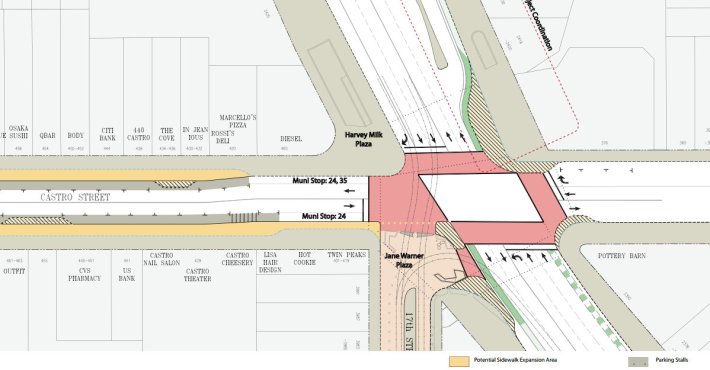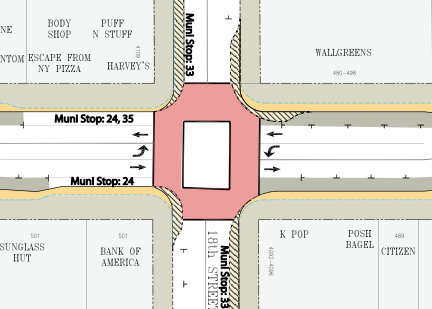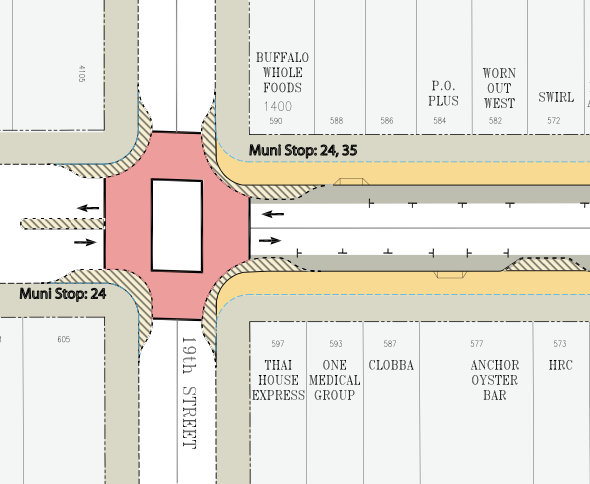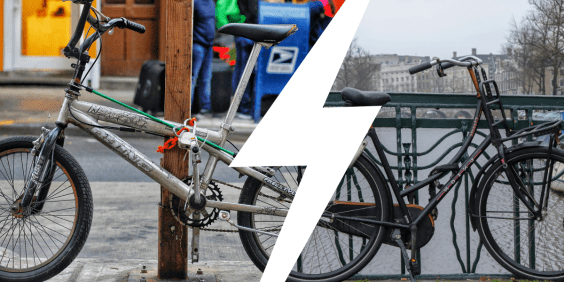The city's effort to make Castro Street more welcoming for pedestrians took a step forward yesterday, when the SF Planning Department presented preliminary design concepts at a packed community meeting.
The plan [PDF] would improve the pedestrian realm on the commercial corridor with wider sidewalks, sidewalk seating, pedestrian-scaled lighting, small plazas, and greening, while reclaiming some of the excessive street space devoted to automobiles, which would reduce double parking and tame motor vehicle traffic.
Castro's intersections with Market/17th (at the Castro Muni Metro Station), 18th, and 19th Streets would also be made safer with bus bulb-outs, sidewalk extensions, and more visible crosswalks re-aligned to shorten crossing distances. Planners are considering banning right-turns at red lights to discourage drivers from blocking crosswalks.
The proposal is based on a plan adopted in 2008 by the Castro/Upper Market Community Benefit District, which, coupled with $4 million in Prop B street improvement bonds recently secured thanks to D8 Supervisor Scott Wiener, helped move the project forward.
"We get used to all sorts of plans and ideas that don't go anywhere because there isn't the political will, or there isn't the money, and to finally have the money set aside set for the project and so much community support is just terrific," said Wiener.
An early milestone came when Jane Warner Plaza was created in 2009, carved out of a section of 17th Street at Castro, as envisioned in the CBD's plan. "Re-claiming that asphalt for people, and the fact that it was instantly occupied and successful, demonstrated that there's a latent demand for more and better-quality public space in this area," said Ed Reiskin, director of the SF Municipal Transportation Agency. "People are sometimes walking in the road to get through the crowded sidewalk."
Attendees at the meeting seemed overwhelmingly supportive of the project, though a few raised concerns about losing car parking. Only a few spots, if any, would be removed, depending on the final design, but that didn't placate one merchant who said she didn't want the rampant, illegal double parking on Castro (which causes a traffic mess, endangers bicycle riders, and slows down Muni) to go away.
The opponents don't seem to have much sway. Andrea Aiello, executive director of the Castro CBD, said such a fixation on parking was held by only some merchants, and that the benefits of the improvements would outweigh any perceived drawbacks.
"A lot of commercial streets in San Francisco exist without double parking," said Aiello. "I think it'll be safer for everyone in the long run."
"This is an opportunity to do some really great things that will enhance business and make the space more livable and enjoyable, and make the sidewalk a space that you don't just have to walk all the time, but some of the restaurants can have tables and chairs, and really add life to the Castro," said Department of Public Works Director Mohammed Nuru.
The Planning Department expects to present a refined design at another community meeting in late February, and construction could begin late this year.









